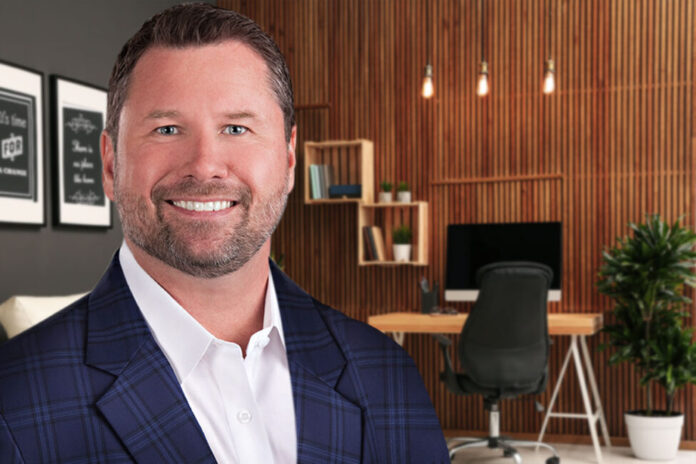Brian Mingham is the Founder and CEO of CFSI Loan Management, Brian is a thought leader, influencer, visionary, and successful entrepreneur. Brian provides the leadership and energy that has inspired the creation of CFSI Loan Management.
Brian Mingham joins other leading Bestselling Authors, International Speakers & Entrepreneur, CEOs and Founders taking part in our Leader Roundtable Interview Series. The DotCom Magazine editorial team is delighted to have Brian join us for our Leader Roundtable Interview.
Let us start by telling us about your business.
CFSI Loan Management is a risk mitigation and portfolio management company specializing in construction loan management. Our company helps lenders reduce construction loan risk on residential, commercial, and multi-family properties for conventional, warehouse, SBA, and commercial lenders. We work with large and small financial institutions as well as commercial lenders to protect our clients’ interest throughout the entire construction loan phase. Our goal throughout this process is to provide industry best practices and risk mitigation procedures to monitor construction projects. Some of primary services include contractor and project reviews, funds control, draw inspections, and portfolio audits.
We also review project feasibility and can confirm a contractor’s ability to complete a project. Our company will initiate a comprehensive review of a contractor’s qualifications to ensure that they can complete the planned asset on time and within budget.
Q: Please tell us how you make sure your customers will become raving fans of your company?
Every interaction is built on integrity. We have a high-touch, customer-centric approach which allows lenders to concentrate on originating construction loans while CFSI manages the construction phase from beginning to end. Our primary goal is to ensure that our clients receive the best and quickest service possible. At the core of CFSI, we focus on people, standards, and service, all of which focus on improving the client experience.
We manage everything so that our clients don’t have to. As a detail-oriented team, our clients appreciate that we go above and beyond their expectations.
Q: Please tell us the one thing that separates your business from the competition.
Our company stands out from the competition due to our diligence, attention to detail, and unbeatable industry knowledge. There is no single company that stacks up against CFSI. CFSI hires and trains the best people and inspectors in the business—our people make our business great. We have a strict vendor selection criterion, and a formal due diligence process that helps us to manage quality while ensuring our clients receive the best and quickest service possible.
From managing the construction budget to reviewing project feasibility, our team is dedicated, focused, and passionate about what we do, and that is what separates us from the competition.
Q: And to finish this section, please tell us what the one major key to your company’s success is?
We have incredibly high standards in the way we conduct business and interact with clients. If there is an opportunity to go above and beyond, we go above and beyond—no questions asked. Since I founded the company in 2012, our clients have always come first.
Q: For our readers just starting to build a company, what advice can you give entrepreneurs just starting out with a new venture?
First and foremost, find a mentor. I have met too many entrepreneurs who try to ‘go it alone’ when they don’t have to. Entrepreneurship is a road well-traveled, and there are hundreds of thousands of people willing to pass on valuable industry knowledge to an ambitious business owner. There is no golden formula for entrepreneurship, especially considering the diversity of businesses, products, and services out there. So having someone you can speak to when you run into problems, need to scale, or are looking for a network connection, is priceless.
Second, be patient. There is a common misconception that building, growing, and scaling a business overnight makes it a success—it doesn’t. A business is like a pyramid, the hardest part is building the foundation. If you get the foundation wrong, you will be unlikely to grow your business.
Lastly, remain open-minded. When you start a new business, you likely have an idea or vision about where you want to be, and how you’re going to get there. My best advice? Be stubborn about your goals but be flexible about your methods. Starting a new business will throw challenges at you that you could not have imagined, so be willing to adjust your plans accordingly to achieve the same outcome.
Q: For entrepreneurs seeking to build a business as successful as yours, what big piece of advice can you give them when times get a little challenging?
Remember that it is the only failure if you give up. We all face challenges as entrepreneurs, but it is our resilience that makes us successful. If you keep an open mind, you will find opportunities at every turn. The key is not to focus on problems, but rather, to come up with solutions as quickly as possible. Give yourself space and time to reflect upon the problem, but not so long that it paralyzes you from acting.
Secondly, you have to take care of yourself even when your business is struggling, because if you don’t you will eventually burn out. Take breaks and allow yourself to re-evaluate whether where you are is working for you. Sometimes we get so caught up in meetings, phone calls, site visits that we forget to manage a focused vision of the future. Your job, as a business leader, is to remain agile, flexible, and always focused on your future trajectory.
Q: In today’s fast-changing business environment, how do you stay abreast of things?
If you’re constantly seeking new information, you will always be behind. My best advice is to sign up for e-mail newsletters relevant to your industry and put time aside every morning, afternoon, or evening to read through that content. This is a simple hack to stay on top of what is happening without having to put in too much effort.
Another great way to stay on top of your industry is to network with other professionals with similar interests. Organize monthly ‘information sessions’ where you share new information, technologies, and resources to help one another stay abreast of things. Not only does this allow you to stay ahead of the game, but it allows you to continually build and strengthen your network.
Lastly, sign up for seminars, workshops, and conferences whenever you can. If you can’t attend due to other commitments, consider sending a dedicated employee in your place who can diligently report back anything you might need to know.
Q: What is your “Why”? In one sentence, why do you get up in the morning?
‘My ‘why’ is to help others reduce their risk and build safe and connected communities’. At CFSI Loan management, our primary goal is to help lenders reduce risk related to construction projects nationwide. But what we really do is help other people achieve their dreams by ensuring that construction projects run smoothly from start to finish. Our clients are passionate about their projects, and it is a joy to aid in bringing them to life.
Q: In one sentence, what is the most important thing one has to do to be a great leader?
‘If you want to be a great leader, you need to be open-minded’. Leaders who refuse to see other viewpoints or perspectives are unlikely to motivate inspired teams. No matter how long you’ve been in business, who you know, or what you have accomplished, if you do not have an open mind your business will eventually stagnate.
Being open-minded means adapting to the needs of your team, it means looking for solutions rather than focusing on problems, and it means no idea is inherently a ‘bad idea’. This is the mentality that allows my team to experiment, use their intuition, and act in a way that feels right to them.
Q: In one sentence, describe how important your customers are to your business?
‘No matter what business you are in, you do not have a business if you do not satisfy your customer’. From ideation to planning and execution, if your customer’s needs are not being met, you do not have a business. When entrepreneurs come to me with their ideas, the first thing I ask is ‘Who is your target demographic/ customer/ audience?’. This is the first question that every business owner should know the answer to, otherwise, they don’t have a business.
Q: In one sentence, describe a positive way that technology can make the world a better place?
‘Technology can make the world a better place by connecting us to different ideas, cultures, and beliefs’. I believe that technology is just a medium, and how it is used is up to us. I am confident that every one of your readers has connected to other groups with the same interest online. Whether you’re interested in interior design or home improvement, I can guarantee that there is a group of people online who can make you feel like part of a tribe.
Q: In one sentence, tell us how something positive to motivate our readers?
‘Everything is fixable.’ One of the ideas that have paralyzed me in the past is the idea that what I am about to do is permanent. This belief will stop you from making mistakes, but it will also stop you from making progress.
As a business owner, the fear of making mistakes is very real and present. However, my team relies on me to be decisive, determined, and confident in my decision making. Even if I do make a mistake, I am confident in my ability to adjust my approach accordingly. Don’t be afraid to take a step forward, be afraid of staying still, acting in fear, and allowing negative projections to control your life.
Q: In one sentence, tell us how you start your day to get ready?
‘I start my day by focusing on myself.’ How you start your day often determines what the rest of your day will look like, so I like to take the time I need to focus on what matters most to me. I get up, exercise, read, shower, have a cup of coffee and read any relevant news. Taking this time for myself allows me to take what I need so that I am able to give my employees and colleagues what they need for the rest of the day. In order to fill other people’s cups, you have to fill your own first.
Q: In one sentence, describe how you handle rejection and setback?
‘I accept it, feel it, and then move forward’. Failure, rejection, and setbacks are tough. As a successful entrepreneur, I can tell you that no matter how many times it happens, it never hurts any less. When you pour your heart and soul into anything, it always stings to get rejected. However, what you do learn is that every rejection or failure is a ‘re-direct’, it is a sign that you need to try something new—it means that you are one step closer to success.
Trying something and failing is not shameful. Trying something, failing, and giving up can be. Successful entrepreneurs are not unique, smarter, or more talented than most people, but what they do have is grit. Grit is sticking with something even when it gets hard—and that is something we can all learn to cultivate with enough practice.
Q: In one sentence, describe what your hiring philosophy is?
‘Always hire for skills that cannot be taught’. Too often I see companies hiring people solely on their merits alone: how many awards they’ve won, what school they graduated from, who they volunteered for. Don’t get me wrong, all of those things are important, but taking initiative, asking thoughtful questions, coming prepared, doing your research—those are the things that show true character.
We all embellish who we are on paper, but it is difficult to embellish who you are in person. How much passion, attention to detail, and excitement you bring to a job interview tells me a lot more about how you will perform your duties than what is on paper.
Q: In one sentence, describe how you keep your sanity in a competitive business environment?
‘The race is long, and the competition is only with yourself.’ I spent years comparing myself to my classmates, colleagues, and friend until I realized that we weren’t running the same race. Some people find passion at 5 years old; some people find their passion at 75 years old. It doesn’t matter how old you are, how long it takes, what matters is that you enjoy what you are doing, and that you are constantly challenging yourself.
Website www.brianmingham.com
Facebook www.facebook.com
Twitter https://twitter.com/brianmingham
Linkedin www.linkedin.com
Brian Mingham, thank you so much for participating in the DotCom Magazine Leader Roundtable Interview Series. We appreciate you participating in this important roundtable interview series, and helping our readers learn more about what it takes to build a great company and become a great leader. We wish you, your family, and of course CFSI Loan Management, nothing but the best.






















